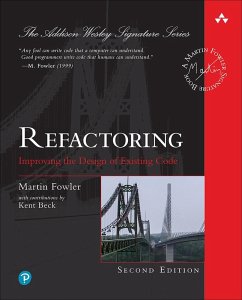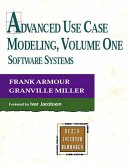Martin Fowler's guide to reworking bad code into well-structured code
Refactoring improves the design of existing code and enhances software maintainability, as well as making existing code easier to understand. Original Agile Manifesto signer and software development thought leader, Martin Fowler, provides a catalog of refactorings that explains why you should refactor; how to recognize code that needs refactoring; and how to actually do it successfully, no matter what language you use.
Examples are written in JavaScript, but you shouldn't find it difficult to adapt the refactorings to whatever language you are currently using as they look mostly the same in different languages.
"Whenever you read [Refactoring], it's time to read it again. And if you haven't read it yet, please do before writing another line of code." -David Heinemeier Hansson, Creator of Ruby on Rails, Founder & CTO at Basecamp
"Any fool can write code that a computer can understand. Good programmers write code that humans can understand." -M. Fowler (1999)
Refactoring improves the design of existing code and enhances software maintainability, as well as making existing code easier to understand. Original Agile Manifesto signer and software development thought leader, Martin Fowler, provides a catalog of refactorings that explains why you should refactor; how to recognize code that needs refactoring; and how to actually do it successfully, no matter what language you use.
- Refactoring principles: understand the process and general principles of refactoring
- Code smells: recognize "bad smells" in code that signal opportunities to refactor
- Application improvement: quickly apply useful refactorings to make a program easier to comprehend and change
- Building tests: writing good tests increases a programmer's effectiveness
- Moving features: an important part of refactoring is moving elements between contexts
- Data structures: a collection of refactorings to organize data, an important role in programs
- Conditional Logic: use refactorings to make conditional sections easier to understand
- APIs: modules and their functions are the building blocks of our software, and APIs are the joints that we use to plug them together
- Inheritance: it is both very useful and easy to misuse, and it's often hard to see the misuse until it's in the rear-view mirror---refactorings can fix the misuse
Examples are written in JavaScript, but you shouldn't find it difficult to adapt the refactorings to whatever language you are currently using as they look mostly the same in different languages.
"Whenever you read [Refactoring], it's time to read it again. And if you haven't read it yet, please do before writing another line of code." -David Heinemeier Hansson, Creator of Ruby on Rails, Founder & CTO at Basecamp
"Any fool can write code that a computer can understand. Good programmers write code that humans can understand." -M. Fowler (1999)
Dieser Download kann aus rechtlichen Gründen nur mit Rechnungsadresse in A, B, BG, CY, CZ, D, DK, EW, E, FIN, F, GR, HR, H, IRL, I, LT, L, LR, M, NL, PL, P, R, S, SLO, SK ausgeliefert werden.









